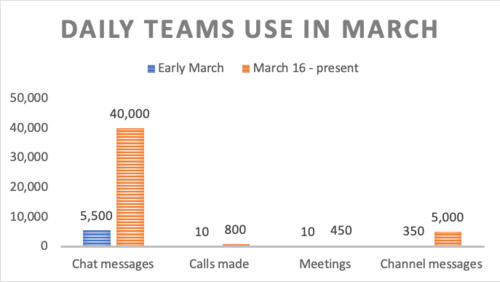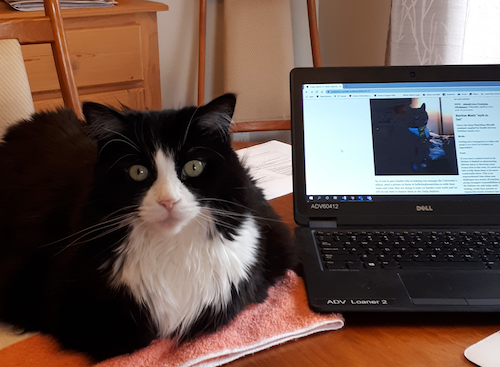The Daily Bulletin is published by Internal and Leadership Communications, part of University Communications
Contact us at bulletin@uwaterloo.ca
Submission guidelines
Editor:
Brandon Sweet
University Communications
bulletin@uwaterloo.ca

A message from Information Systems and Technology (IST).
As the campus community settles into working remotely, it’s more important than ever to find a way to stay connected to our teammates and colleagues. With Microsoft Teams, University employees can easily connect, collaborate, and share files and resources, no matter where they are.
Microsoft Teams is one of the cloud-based applications available under the Microsoft Office 365 suite all University employees have access to. Teams brings people and resources together, allowing users to chat, meet, call, and collaborate all in one place. Create a Team for a unit or department, a certain topic or focus, or specific project – just to name a few!
A Team is created with at least one Team Owner and other users are added as Members. Owners have permissions to add other members and facilitate the creation of private channels. Guests (non-Waterloo employees) can also be added to a Team using their external email address.
Public or private channels are created within the Team to organize the work of its members.
Other apps, like OneNote, Flow, Planner or even a website, can be added within the Team to enhance member activity. Teams also supports calendar booking and meetings, and both audio and video calling.
As of early March, a total of 613 Teams had been created by IST and were being used by members of the campus community. From March 13-26, leading up to and following the work from home mandate, an additional 548 Teams were requested. In what turns out to be a welcome coincidence, IST had just replaced the previous, manual Teams creation process with a custom-built, automated solution.
Data shows Teams is becoming one of the most-used services across campus. The below table represents approximate daily usage in March.

Being part of a Team has many benefits, but individuals don’t need to be a member of a Team to connect with colleagues. Individuals can still book a Teams meeting directly in Outlook or download and log in to Teams to make voice/video calls, all without being a member of an actual Team.
IST will be enabling a new “dial-in” feature that will allow individuals that don’t have access to a computer to call in to participate in a Teams meeting.
IST will be hosting a second live, online training course on Tuesday, March 31 from 10:00 a.m. to 11:00 a.m. More details are available on the IST website.
Can’t attend this live session? View a recording of the first training session.
Visit IST’s Microsoft Teams website to learn more, request a Team, view the FAQs, and browse support resources.

Each March Pharmacist Awareness Month (PAM) celebrates the contributions that pharmacists make to our health care system. This month, the School of Pharmacy is showcasing how our alumni go beyond dispensing pills and play a pivotal role in the health of Canadians with #RethinkPharmacists content.
If you live in a rural Ontario community, you face greater challenges accessing health resources than your urban counterparts. There are fewer health services and supports available nearby, and residents often have to travel far for appointments.
That’s where pharmacists come in. In communities where services are scarce, pharmacists can provide support to help patients access health knowledge and medications.
Alumnus Christine Sorin is doing just that. An experience in pharmacy school led her to practise in Sioux Lookout, a remote community five-and-a-half hours north of Thunder Bay. Christine’s patients are largely Indigenous Canadians, many of whom live in remote communities in the surrounding area. Many patients are flown into the Health Centre she works at, and she’s travelled to several northern communities to provide education on medication needs and side effects.
“We hear about systemic racism in the classroom but it’s different to be able to appreciate the effects of it first-hand. My experiences in Sioux Lookout made me want to be the kind of pharmacist who provides equitable health care. At the hospital here, I have so many opportunities to do just that.”
Read more about Christine’s experiences in Sioux Lookout.
For the first time, the University's Senate will be meeting virtually, with an online meeting set to take place in Microsoft Teams a 3:30 p.m. today. The move to an online format is in keeping with the University's decision to suspend all in-person events until further notice. Check out the meeting's open session today. Among the agenda items:
Check out the full meeting agenda on the Secretariat website.
Well, we put out the call for pet photos and boy howdy, did you deliver. Here is the first set of furry friends helping the University community get through our physically distant, remote working reality:

"Here's Storm, helping me do some marking and keep in touch with my coworkers," writes Emma Dare, lab coordinator in Kinesiology. "I think she loves having the extra attention with everyone being home all the time!"

"This is K (straight-up rockin’ the single initial), Coordinator of Domestic Initiatives," writes Carrie Gabla, senior communications officer in Advancement.

"Athena reminds us of the importance of wellness while work from home. Specifically taking ample stretch breaks and nap breaks," writes Sarah Howard, graduate student experience specialist in Graduate Studies and Postdoctoral Affairs.

"This is my coworker Coco. She initially spent countless hours swishing around me, pestering me to pay attention to her and trying to gain access to my lap," writes Tracey Szarka, undergraduate advisor and coordinator in Electrical & Computer Engineering. "Since I set up a work station for her, she's been assisting me by providing facial feedback on ideas and communication drafts. She is invariably skeptical."
Stay tuned for more pet pics tomorrow, and remember, if you want to have your furry co-worker featured in the Daily Bulletin, send a photo with your pet's name (and how they're helping you) to bulletin@uwaterloo.ca.
100 years ago: John Barrymore in Dr. Jekyll and Mr. Hyde
Instructors can visit the Keep Learning website to get support on adapting their teaching and learning plans for an online environment.
Employees can access resources to help them work remotely.
Here are some tips for staying healthy while working from home.
The Writing and Communications Centre has gone virtual to provide assistance.
We understand that these circumstances can be troubling, and you may need to speak with someone for emotional support. Good2Talk is a post-secondary student helpline based in Ontario, Canada that is available to all students.
If you feel overwhelmed or anxious and need to talk to somebody, please contact the University’s Campus Wellness services, either Health or Counselling Services.
WUSA supports for students:
Student Food Bank food hampers are currently available 24/7 at the Turnkey Desk in the Student Life Centre. If you have any questions please email us at foodbank@wusa.ca.
MATES – Providing general online Peer Support via Skype to undergraduate students. To set up an appointment, please contact mates@wusa.ca
Empower Me is a confidential mental health and wellness service that connects students with qualified counsellors 24/7. They can be reached at 1-844-741-6389.
Glow Centre - Providing online Peer Support for the LGBTQ2+ community via Skype to Undergraduate students. To set up an appointment, please contact glow@wusa.ca
Centre for Academic Policy Support - CAPS is here to assist Waterloo undergraduates throughout their experience in navigating academic policy in the instances of filing petitions, grievances and appeals. Please contact them at caps@wusa.ca . More information at http://wusa.ca/caps
WUSA Commissioners who can help in a variety of areas that students may be experiencing during this time:
WUSA Student Legal Protection Program - Seeking legal counsel can be intimidating, especially if it’s your first time facing a legal issue. The legal assistance helpline provides quick access to legal advice in any area of law, including criminal. Just call 1-833-202-4571.
Please note: The University has suspended all in-person events until further notice. Please contact the event organizers to confirm whether the event has shifted to an online mode of delivery.
If you have listed an event with the Daily Bulletin and need to cancel, postpone or modify the listing, please send an email to bulletin@uwaterloo.ca.
If you have an upcoming event that has not yet appeared in the When and Where listing, please send an email to bulletin@uwaterloo.ca to confirm the event's status.
NEW - Warrior Recreation online workouts, Monday to Friday, three times a day at 10:30 a.m., 3:00 p.m. and 8:00 p.m. Workouts will be broadcasted live through ZOOM Video Communications.
Writing and Communications Centre virtual writing cafés, Tuesdays, 9:00 a.m. to 12:00 p.m., Wednesdays, 2:00 p.m. to 4:30 p.m., Fridays, 9:00 a.m. to 12:00 noon.
University Senate meeting, Monday, March 30. Note: this meeting will take place online.
Map the System Campus Finals, “A global competition that challenges students to think differently about social and environmental change.” Monday, April 6, 11:00 a.m. to 1:00 p.m. Please note: The top three teams and campus nominee for the Map the System Canadian finals in May (to be held online) will now be selected based on written submissions due at 6:59 p.m. EST on April 8.
Faculty Association Spring General Meeting, Tuesday, April 7, 12:00 p.m. Note: this event will take place online.
NEW - Managing Micro-aggressions in the Workplace, Tuesday, April 7, 1:00 p.m. to 2:00 p.m., Hosted by the Canadian Centre for Diversity and Inclusion, Register online.
Simple and Effective Online Teaching with Victoria Feth and James Skidmore, Wednesday, April 8, 11:00 a.m. to 12:00 noon.
To join this online training session
-------------------------------------------------------
1. Go to the UWaterloo Webex site
2. Enter your name and email address.
3. Enter the session password: remotelearning
4. Click "Join Now".
5. Follow the instructions that appear on your screen.
Akindi Live Training (Webinar), Thursday, April 9, 2:00 p.m. to 3:00 p.m.
Here's the latest Nutrition Month "myth vs. fact" supplied by Health Services Dietitian Sandra Ace:
Myth:
Intermittent fasting is a safe and effective weight loss diet.
Fact:
Intermittent fasting (IF) is a type of diet that prescribes alternate periods of eating and fasting in order to delay or prevent health problems or, most often, to lose weight. One form is the 5:2 diet, which involves eating regular meals for 5 days then eating very little for the next 2 days, then repeating the cycle. Another variation is alternate day fasting. Probably the more popular intermittent fasting pattern is 16:8 fasting, which involves eating during an 8 hour window followed by a 16 hour fast, undertaken on a daily basis. There are no restrictions on the type or amount of food eaten during the eating window.
Most of the research on IF has been carried out on laboratory rats and the few human studies done have been small and have yielded inconclusive or contradictory results. One larger study tracked 100 obese subjects for one year and concluded that intermittent fasting (alternate day) was no more effective for weight loss than daily caloric restriction. A promising area of research is that time-restricted eating (such as the 16:8 diet) may improve insulin sensitivity in those who are at risk for diabetes or whose blood glucose is in the pre-diabetes range. However, before IF can be recommended as a treatment for obesity or any other health condition, much more research needs to be done.
Intermittent fasting can be difficult to adhere to and the long term safety and effectiveness is not known. Without careful planning, IF can result in nutrient deficiencies as well as low blood sugar or intense hunger during fasting periods. Intermittent fasting may pose a significant risk for some individuals, including those who have a history of disordered eating, those who currently have diabetes and women who are pregnant or breastfeeding. If you are considering any variation of intermittent fasting, first discuss this with your physician and get advice from a registered dietitian to ensure you meet your nutrient needs.
A lifestyle approach that includes eating regular, varied and balanced meals, being physically active most days and getting adequate sleep supports both a healthy weight and a lowered risk of many chronic diseases.
Economics. Annie Pan, "Essays in Wealth Effect, Family Structure, and Female Labour Supply." Supervisors, Stephanie Lluis, Ana Ferrer. On deposit in the Arts graduate office, PAS 2428. Oral defence Thursday, April 2, 9:00 a.m., PAS 2464. Please note: this defence will be presented online.
Psychology. Brenda Chiang, "On Obsessions: A Phenomenology of Doubt, Images, and the Obsessive-Compulsive Chronological Structure in Obsessive-Compulsive Disorder." Supervisor, Christine Purdon. On deposit in the Arts graduate office, PAS 2428. Oral defence Thursday, April 2, 1:00 p.m., PAS 2464. Please note: this defence will be presented online.
Economics. Andres Arcila Vasquez, "Three Essays in Policy Evaluation." Supervisor, Ana Ferrer. On deposit in the Arts graduate office, PAS 2428. Oral defence Friday, April 3, 1:30 p.m., PAS 2464. Please note: this defence will be presented online.
Religious Studies. Scott Wall, "Multi-sited Faith: Chinese Canadian, Young Adult Evangelicals and the Negotiation of Ethno-Religious Identity in the Greater Toronto Area." Supervisor, David Seljak. On deposit in the Arts graduate office, PAS 2428. Oral defence Thursday, April 8, 9:00 p.m., PAS 2438. Please note: this defence will be presented online. Please note the updated time.
The Daily Bulletin is published by Internal and Leadership Communications, part of University Communications
Contact us at bulletin@uwaterloo.ca
Submission guidelines
The University of Waterloo acknowledges that much of our work takes place on the traditional territory of the Neutral, Anishinaabeg, and Haudenosaunee peoples. Our main campus is situated on the Haldimand Tract, the land granted to the Six Nations that includes six miles on each side of the Grand River. Our active work toward reconciliation takes place across our campuses through research, learning, teaching, and community building, and is co-ordinated within the Office of Indigenous Relations.